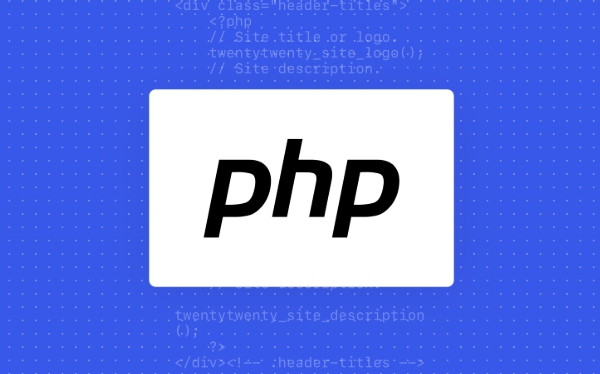 Backend Development
Backend Development
 PHP Tutorial
PHP Tutorial
 The `global` Keyword: A Double-Edged Sword in PHP Scope Management
The `global` Keyword: A Double-Edged Sword in PHP Scope Management
The `global` Keyword: A Double-Edged Sword in PHP Scope Management
Jul 25, 2025 pm 05:37 PMThe global keyword in PHP allows functions to access variables from the global scope, but it should be used sparingly due to significant drawbacks. 1) It enables quick access to configuration values in small or legacy scripts. 2) It fits procedural codebases like older WordPress plugins where dependency injection isn't used. 3) It allows shared state across functions, though this can lead to tight coupling. However, 1) tight coupling makes functions less reusable and harder to test. 2) unintended side effects occur when one function alters a global variable unexpectedly. 3) testing becomes complex due to required global state setup. 4) data flow is obscured, reducing code clarity. Better alternatives include passing parameters, returning values, using dependency injection, defining constants for configuration, or employing static variables. In modern PHP, explicit dependencies are preferred over global for maintainability and transparency, so global should only be used for debugging or maintaining legacy code, not in new projects.

The global keyword in PHP is often used to access variables from the global scope inside functions. While it can be useful in specific scenarios, its use comes with trade-offs that make it a double-edged sword in scope management.

What global Does
When you declare a variable inside a function using the global keyword, PHP links that variable to the same name in the global scope. Without global, any variable inside a function is local by default.
$color = 'blue';
function showColor() {
global $color;
echo $color; // Outputs: blue
}
showColor();This seems straightforward—but here's where things get tricky.

The Pros: When global Makes Sense
Quick Access to Configuration Values
In small scripts or legacy code, you might store configuration settings in global variables. Usingglobalallows functions to read these without passing them as parameters.Working with Procedural Codebases
In older PHP applications (e.g., early WordPress plugins),globalis common because the code relies on procedural patterns rather than dependency injection or object-oriented design.
Shared State Across Functions
Sometimes multiple functions need to modify or read the same data.globaloffers a simple way to share that state—though not necessarily a good one.
The Cons: Why global Is Risky
Tight Coupling
Functions that rely onglobalvariables become tightly coupled to the global scope. This makes them harder to reuse, test, or reason about because they depend on external state.Unintended Side Effects
Sinceglobalgives read-write access, one function can unexpectedly alter a variable another function depends on.
$count = 0;
function increment() {
global $count;
$count ;
}
function resetCounter() {
global $count;
$count = 0;
}Now imagine calling resetCounter() in an unrelated part of the app—suddenly increment() stops working as expected.
Harder to Test
Unit testing functions withglobalrequires setting up global state before each test, which violates isolation principles and complicates test suites.Obscures Data Flow
Instead of seeing inputs and outputs clearly (like with parameters and return values), you have to trace through code to figure out where a variable came from or who changed it.
Better Alternatives
Instead of relying on global, consider these cleaner approaches:
Pass Variables as Parameters
function showColor($color) { echo $color; }Return Values and Reassign
function setColor($newColor) { return $newColor; } $color = setColor('green');Use Dependency Injection Especially in OOP contexts, inject needed data into classes or methods instead of pulling from globals.
Configuration via Constants or Arrays For settings, use
define()or config arrays passed explicitly.Static Variables or Closures When Appropriate If you need persistent state within a function,
staticmay be safer thanglobal.
Bottom Line
The global keyword works—but it's a shortcut that sacrifices clarity and maintainability. It’s not inherently evil, but overuse leads to spaghetti code. In modern PHP development, explicit dependencies beat hidden global references every time.
Use global sparingly, if at all—mostly for quick debugging or maintaining legacy code. For new projects, favor transparency over convenience.
Basically, just because PHP lets you reach into the global scope doesn’t mean you should.
The above is the detailed content of The `global` Keyword: A Double-Edged Sword in PHP Scope Management. For more information, please follow other related articles on the PHP Chinese website!

Hot AI Tools

Undress AI Tool
Undress images for free

Undresser.AI Undress
AI-powered app for creating realistic nude photos

AI Clothes Remover
Online AI tool for removing clothes from photos.

Clothoff.io
AI clothes remover

Video Face Swap
Swap faces in any video effortlessly with our completely free AI face swap tool!

Hot Article

Hot Tools

Notepad++7.3.1
Easy-to-use and free code editor

SublimeText3 Chinese version
Chinese version, very easy to use

Zend Studio 13.0.1
Powerful PHP integrated development environment

Dreamweaver CS6
Visual web development tools

SublimeText3 Mac version
God-level code editing software (SublimeText3)

Hot Topics
 The Omnipresent Scope: A Practical Guide to PHP's Superglobals
Jul 26, 2025 am 09:47 AM
The Omnipresent Scope: A Practical Guide to PHP's Superglobals
Jul 26, 2025 am 09:47 AM
PHP's hyperglobal variables are always available built-in arrays used to process request data, manage state and obtain server information; 1. When using $_GET, URL parameters need to be type-converted and verified; 2. When receiving form data through $_POST, filtering should be performed with filter_input(); 3. Avoid using $_REQUEST to prevent security vulnerabilities; 4. $_SESSION needs to call session_start() and log in to reset the session ID; 5. When setting $_COOKIE, enable secure, httponly and samesite attributes; 6. The information in $_SERVER cannot be fully trusted and cannot be used for security verification; 7.$_ENV may be
 Navigating the Boundaries: A Deep Dive into Local and Global Scope
Jul 26, 2025 am 09:38 AM
Navigating the Boundaries: A Deep Dive into Local and Global Scope
Jul 26, 2025 am 09:38 AM
Thedifferencebetweenlocalandglobalscopeliesinwherevariablesaredeclaredandaccessible:globalvariablesaredefinedoutsidefunctionsandaccessibleeverywhere,whilelocalvariablesaredeclaredinsidefunctionsandonlyaccessiblewithinthem.1.Globalscopeallowsbroadacce
 Demystifying Global Access: `global` Keyword vs. the `$GLOBALS` Array
Jul 25, 2025 am 05:27 AM
Demystifying Global Access: `global` Keyword vs. the `$GLOBALS` Array
Jul 25, 2025 am 05:27 AM
ThetwomaintoolsforaccessingglobalvariablesinPHParetheglobalkeywordandthe$GLOBALSsuperglobalarray;1)Theglobalkeywordcreatesareferencetoaglobalvariableinsideafunction,allowingdirectaccessandmodification,andifthevariableisundefined,itinitializesitasnull
 Mastering Lexical Scoping: The `use` Keyword and PHP Anonymous Functions
Jul 25, 2025 am 11:05 AM
Mastering Lexical Scoping: The `use` Keyword and PHP Anonymous Functions
Jul 25, 2025 am 11:05 AM
In PHP, if you want to use external variables in anonymous functions, you must explicitly import them through the use keyword; 1. Use is used to introduce external variables into the lexical scope of the closure; 2. Pass variables by default by value, and pass them by reference with &$var syntax; 3. Multiple variables can be imported, separated by commas; 4. The value of the variable is captured when the closure is defined, not when it is executed; 5. Each iteration in the loop creates an independent closure copy to ensure that the variable value is correctly captured; therefore, use is a key mechanism to achieve the interaction between the closure and the external environment, making the code more flexible and controllable.
 The Scope Resolution Order: How PHP Finds Your Variables
Jul 25, 2025 pm 12:14 PM
The Scope Resolution Order: How PHP Finds Your Variables
Jul 25, 2025 pm 12:14 PM
PHPresolvesvariablesinaspecificorder:1.Localscopewithinthecurrentfunction,2.Functionparameters,3.Variablesimportedviauseinclosures,4.Globalscopeonlyifexplicitlydeclaredwithglobaloraccessedthrough$GLOBALS,5.Superglobalslike$_SESSIONand$_POSTwhichareal
 Why Your Variables Disappear: A Practical Guide to Scope Puzzles
Jul 24, 2025 pm 07:37 PM
Why Your Variables Disappear: A Practical Guide to Scope Puzzles
Jul 24, 2025 pm 07:37 PM
Variablesdisappearduetoscoperules—wherethey’redeclareddetermineswheretheycanbeaccessed;2.Accidentalglobalcreationoccurswhenomittingvar/let/const,whilestrictmodepreventsthisbythrowingerrors;3.Blockscopeconfusionarisesbecausevarisfunction-scoped,unlike
 Scope Implications of Generators and the `yield` Keyword
Jul 25, 2025 am 04:45 AM
Scope Implications of Generators and the `yield` Keyword
Jul 25, 2025 am 04:45 AM
Functions using yield will become generators, and when called, they return the generator object instead of being executed immediately; 2. Local variables of the generator will not be destroyed during the yield pause, but will continue to exist with the generator frame until the generator is exhausted or closed; 3. Extended variable life cycle may lead to an increase in memory usage, especially when referring to large objects; 4. When combined with closures, LEGB rules are still followed, but the latebinding problem of looping variables needs to be solved by immediately binding (such as the default parameter value); 5. .close() should be called explicitly to ensure that finally block execution is performed to avoid delays in resource cleaning. The generator affects memory and behavior by extending the survival time of variables, but does not change the lexical scope rules.
 The `global` Keyword: A Double-Edged Sword in PHP Scope Management
Jul 25, 2025 pm 05:37 PM
The `global` Keyword: A Double-Edged Sword in PHP Scope Management
Jul 25, 2025 pm 05:37 PM
TheglobalkeywordinPHPallowsfunctionstoaccessvariablesfromtheglobalscope,butitshouldbeusedsparinglyduetosignificantdrawbacks.1)Itenablesquickaccesstoconfigurationvaluesinsmallorlegacyscripts.2)ItfitsproceduralcodebaseslikeolderWordPresspluginswheredep






